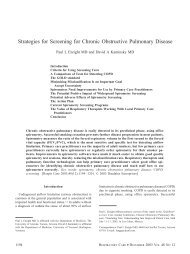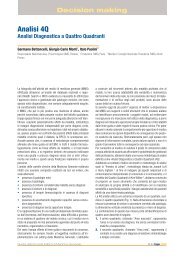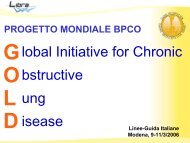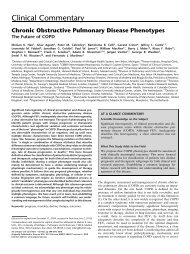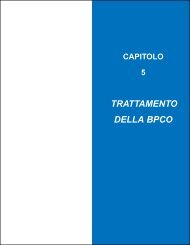Individual behavioural counselling for smoking cessation ... - GOLD
Individual behavioural counselling for smoking cessation ... - GOLD
Individual behavioural counselling for smoking cessation ... - GOLD
You also want an ePaper? Increase the reach of your titles
YUMPU automatically turns print PDFs into web optimized ePapers that Google loves.
in Lifrak 1997, would be a clinically useful benefit if this size of<br />
effect was shown to be robust in other studies. Some caution is<br />
needed because the size of the treatment effect was due in part to<br />
a rather low quit rate from the moderately intense intervention in<br />
Alterman 2001.<br />
In one study a population recruited in primary care who were<br />
willing to accept treatment but were not treatment seekers were<br />
offered individual <strong>counselling</strong> in addition to an eight-week course<br />
of NRT. This did not significantly increase quit rates over use of<br />
NRT alone although the confidence intervals did not exclude a<br />
useful benefit. Compliance with the <strong>counselling</strong> was moderate,<br />
with two-thirds attending at least one session but only 41% attending<br />
all four. Attending more sessions was associated with higher<br />
quit rates (Fiore 2004). In a separate group of participants allowed<br />
to choose the level of psychosocial support, the largest proportion<br />
opted <strong>for</strong> <strong>counselling</strong>. Their quit rates were almost identical to<br />
those included in the review who were randomly assigned.<br />
The failure to detect a significant incremental benefit of <strong>counselling</strong><br />
when provided in addition to NRT should not be interpreted<br />
as evidence that <strong>counselling</strong> is not effective in this context. It<br />
may however indicate that the relative additional benefit is smaller<br />
when the quit rates in the control group are already increased by<br />
the use of an effective pharmacotherapy. Average quit rates in both<br />
intervention and controls in this subgroup were higher than in the<br />
intervention and controls not receiving pharmacotherapy, and the<br />
absolute difference in quit rates was similar in the two subgroups.<br />
As already noted though, direct comparison of quit rates requires<br />
caution because of multiple differences between trials. It is also<br />
possible that there is no true difference between this subgroup of<br />
trials and the others and that the smaller estimated effect and lack<br />
of significance is a chance finding. We did not prespecify a subgroup<br />
analysis based on use of pharmacotherapy, and it does not<br />
contribute to heterogeneity between the results.<br />
A U T H O R S ’<br />
Implications <strong>for</strong> practice<br />
C O N C L U S I O N S<br />
Counselling interventions given outside routine clinical care, by<br />
<strong>smoking</strong> <strong>cessation</strong> counsellors including health educators and psychologists,<br />
assist smokers to quit.<br />
Implications <strong>for</strong> research<br />
<strong>Individual</strong> <strong>counselling</strong> is an established treatment <strong>for</strong> <strong>smoking</strong> <strong>cessation</strong>.<br />
Identifying the most effective and cost-effective intensity<br />
and duration of treatment <strong>for</strong> different populations of smokers<br />
is still an area <strong>for</strong> research. However differences in relative effect<br />
are likely to be small, especially when <strong>counselling</strong> is used alongside<br />
pharmacotherapy. Small trials are unlikely to provide clear<br />
evidence of long-term efficacy.<br />
P O T E N T I A L<br />
I N T E R E S T<br />
None known.<br />
C O N F L I C T O F<br />
A C K N O W L E D G E M E N T S<br />
Our thanks to Peter Hajek and Roger Secker-Walker <strong>for</strong> their<br />
helpful comments on the first version of this review.<br />
S O U R C E S O F S U P P O R T<br />
External sources of support<br />
• NHS Research and Development Programme UK<br />
Internal sources of support<br />
• Ox<strong>for</strong>d University Department of Primary Health Care UK<br />
R E F E R E N C E S<br />
References to studies included in this review<br />
Aleixandre 1998 {published data only}<br />
Aleixandre i Marti E, Casanova Matutano MA, Mitjans Lafont J,<br />
Sanchez Mon<strong>for</strong>t J, Sanmartin Almenar A. Clinical trial of two tobacco<br />
use <strong>cessation</strong> interventions in primary care [Ensayo clinico<br />
de dos intervenciones de deshabituacion tabaquica en atencion primaria].<br />
Atencion Primaria 1998;22:424–8. [MedLine: 99058219].<br />
Alterman 2001 {published data only}<br />
Alterman AI, Gariti P, Mulvaney F. Short- and long-term <strong>smoking</strong><br />
<strong>cessation</strong> <strong>for</strong> three levels of intensity of behavioral treatment. Psychology<br />
of Addictive Behaviors 2001;15(3):261–4.<br />
Bobo 1998 {published data only}<br />
∗ Bobo JK, McIlvain HE, Lando HA, Walker RD, Leed Kelly A.<br />
Effect of <strong>smoking</strong> <strong>cessation</strong> counseling on recovery from alcoholism:<br />
findings from a randomized community intervention trial. Addiction<br />
1998;93:877–87. [MedLine: 98416786].<br />
Leed Kelly A, Russell KS, Bobo JK, McIlvain H. Feasibility of <strong>smoking</strong><br />
<strong>cessation</strong> counseling by phone with alcohol treatment center graduates.<br />
Journal of Substance Abuse Treatment 1996;13:203–10. [Med-<br />
Line: 97170019].<br />
Bronson 1989 {published data only}<br />
Bronson DL, Flynn BS, Solomon LJ, Vacek PM, Secker-Walker<br />
RH. Smoking <strong>cessation</strong> <strong>counselling</strong> during periodic health examina-<br />
<strong>Individual</strong> <strong>behavioural</strong> <strong>counselling</strong> <strong>for</strong> <strong>smoking</strong> <strong>cessation</strong> (Review)<br />
Copyright © 2007 The Cochrane Collaboration. Published by John Wiley & Sons, Ltd<br />
6





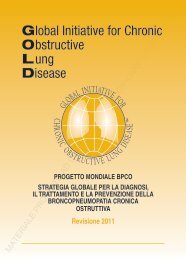
![Di Bari [NO].pdf - GOLD](https://img.yumpu.com/21544924/1/190x143/di-bari-nopdf-gold.jpg?quality=85)


